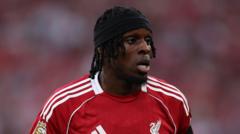The recent injury to a promising player has sent shockwaves through the football community. Jeremie Frimpong, the new right-back for Liverpool, will be sidelined due to a hamstring injury, raising concerns about the team’s defensive strategies as they approach a critical phase of the season. With the international break looming, questions arise regarding how this absence will affect Liverpool’s performance and their tactical approach in upcoming matches. The implications of losing a key player can be significant, potentially altering the dynamics of the team and the expectations of fans and analysts alike.
This setback comes at a time when Liverpool is striving to maintain its competitive edge in both domestic and European competitions. As the team gears up for a series of challenging fixtures, the absence of Frimpong could present an opportunity for other players to step up, yet it also highlights the fragility of squad depth in high-stakes environments. The question remains: how will manager Jürgen Klopp adjust his plans to navigate this unexpected hurdle? The upcoming matches could prove pivotal in determining the team’s trajectory for the rest of the season.
Impact of Frimpong’s Injury on Liverpool’s Defense
Frimpong’s injury is particularly concerning given the current state of Liverpool’s defense. As a newly acquired player, he was expected to solidify the right flank, bringing both speed and technical ability to the backline. His absence will force Klopp to rethink his defensive setup, potentially leading to a reshuffle that could disrupt the team’s chemistry. The right-back position is crucial in modern football, not just for defensive duties but also for contributing to the attack. Without Frimpong, Liverpool may struggle to maintain the same level of offensive pressure from the back.
In his absence, Klopp may look to utilize existing squad members or even consider a shift in formation to accommodate the change. Players such as Trent Alexander-Arnold, who has experience in a more advanced role, could be repositioned, although this would require a compromise on defensive stability. The depth of Liverpool’s squad will be tested, and the team must adapt quickly to ensure they do not fall behind in the league standings.
Moreover, the psychological impact of losing a key player cannot be understated. The team must rally together and find a way to compensate for Frimpong’s absence. This situation could serve as a litmus test for the character and resilience of the squad, with younger players potentially getting their chance to shine. The upcoming matches will reveal whether Liverpool can maintain their competitive edge despite this setback.
Potential Replacements and Tactical Adjustments
With Frimpong sidelined, Liverpool’s coaching staff faces the challenge of identifying a suitable replacement. The options available may include shifting current players into new roles or promoting from within the youth ranks. Klopp has a history of nurturing young talent, and this injury could provide an unexpected opportunity for a less experienced player to make a mark on the first team.
One potential candidate could be Joe Gomez, who has previously played as a right-back and possesses the necessary defensive skills. Alternatively, Klopp may opt for a more attacking-minded player, such as Harvey Elliott, to fill the gap, albeit with a different tactical approach. The decision will hinge on the specific demands of the upcoming fixtures and the overall strategy Klopp wishes to employ.
In any case, the tactical adjustments made in response to Frimpong’s injury could significantly affect Liverpool’s style of play. A more conservative approach may be adopted to compensate for the lack of pace and attacking threat from the right-back position. This could lead to a more compact formation, focusing on strengthening the midfield and defense while relying on counter-attacks as the primary offensive strategy.
Long-term Implications for Liverpool’s Season
The ramifications of Frimpong’s injury extend beyond immediate tactical adjustments. As Liverpool navigates this challenging period, the long-term implications for the season could be profound. The depth of the squad will be tested, and the ability of players to step up in critical situations will be scrutinized. If the team can successfully adjust and maintain performance levels, they could emerge stronger and more cohesive.
However, if the absence of Frimpong leads to a series of poor results, it could impact the morale of the squad and the confidence of the coaching staff. The pressure to perform in high-stakes matches will intensify, and the team may find itself in a precarious position in both league and cup competitions. The potential for injury to other key players during this period adds another layer of uncertainty, making it essential for Liverpool to manage their resources effectively.
Ultimately, how Liverpool responds to this setback will shape their trajectory for the remainder of the season. The ability to adapt and overcome challenges is a hallmark of successful teams, and this situation will serve as a crucial test of Liverpool’s resilience and determination.
The Road Ahead: Navigating Challenges and Opportunities
As Liverpool prepares for the upcoming matches without Frimpong, the focus will inevitably shift to how the team can capitalize on this challenge. The international break may offer a brief respite, allowing players to regroup and prepare for the demanding fixtures ahead. However, the absence of a key player will still loom large as the team looks to maintain its competitive edge.
During this period, the coaching staff will need to implement strategic training sessions to ensure that the squad is well-prepared for the adjustments required. Building chemistry among players who may not have regularly played together will be essential in maintaining performance levels. The team’s ability to adapt quickly will be crucial in ensuring they remain competitive in both domestic and European competitions.
Moreover, the narrative surrounding Frimpong’s injury presents an opportunity for other players to emerge as leaders on the pitch. Young talents may rise to the occasion, showcasing their skills and potentially securing their place in the starting lineup for the future. This situation serves as a reminder of the unpredictable nature of football, where opportunities can arise from adversity.


